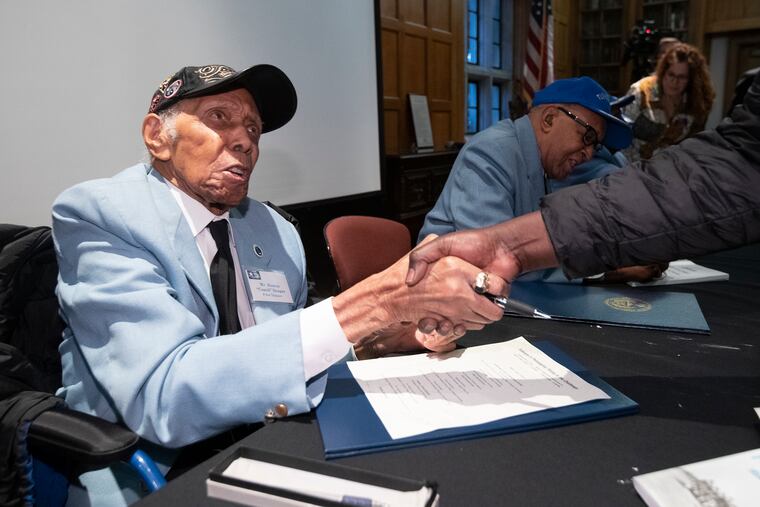The pilot and the professor: A Tuskegee touchdown on the Main Line | Maria Panaritis
“Tuskegee in Philadelphia” hit bookstores this month, thanks in no small part to a West Chester prof and the pro bono work of his students.

It happened inside a Lancaster Avenue hotel restaurant on the Main Line. A moment between strangers.
Roscoe Draper — 100 years old and one of only six remaining African American fighter pilots from our region who made history during World War II — took a seat at the White Horse Tavern. So did his daughter, his son-in-law, and a 52-year-old stranger whom up to that moment Pvt. Draper had known only by name: Robert Kodosky.
They said hello. Introduced themselves. A bit of chatter. Then, Kodosky brandished the 144-page book they had met to see: A glossy sepia cover emblazoned with the words Tuskegee in Philadelphia: Rising to the Challenge. Draper’s face lit up.
“Like a little child on Christmas morning,” Kodosky said of the encounter a few days ago. “He reached his hand across, and he pulled the book over."
To Kodosky, chairman of the West Chester University history department, it seemed like “there was nobody in the room." Draper had his eyes on the book. He ordered soup. And for the rest of the night, between sips, he quietly flipped through the pages, lost in thought.
Here was a professor of military history who had just published a book about Draper and all the heroic African Americans from our region who trained or worked at Tuskegee Army Airfield in Alabama — a segregated government training facility during World War II, where black citizens were taught to fly in war for the first time in U.S. history.
Draper wasn’t, however, flipping through just another news-clip-style or Hollywood-take or oral-history project book. Nor was this only about the brave airmen who flew after being trained at Tuskegee.
For the first time, and with the pro bono help of the professor and six students from West Chester, there is a book that also chronicles the contributions of women, nurses, mechanics, and others among the estimated 16,000 to 19,000 who supported Tuskegee operations between 1941 and 1949.
It explores the difficulties many faced both on the segregated base and back home afterward, where they fought to build lives and support families — but were treated like second-class citizens after defending their country.
Even someone like Draper, who had grown up motherless off Haverford Road in Bryn Mawr and become a brilliant flight instructor, found that his work at Tuskegee meant little after the war.
He’d helped defeat the Nazis only to end up having to take a job with the post office because no one would hire a black man to fly a civilian aircraft. Even north of the Mason-Dixon Line.
“Unbelievable,” Draper recalled as we spoke on Wednesday, “that they didn’t support us any more than they did.”
Mel Payne, the Philadelphia businessman who is president of Greater Philadelphia Chapter of Tuskegee Airmen, had wanted a book just like this. One capturing all the glories and disappointments of Tuskegee. This book was his idea, in fact.
Since Payne was out of town this week, I instead spoke to his group’s treasurer, Vietnam War veteran Aaron Watkins of Phoenixville.
“It was a divine intervention," Watkins said, "for this to happen the way it happened, and the people that got involved and the time that it was all put together.”
The book idea had made its way to Kodosky from the American Helicopter Museum and Education Center in West Chester, where he is a board member. Staff there had been in talks with the Tuskegee chapter about incorporating them into the museum’s programming. Payne told them he’d hoped a book like this could be written before men like Draper were dead and their stories forgotten.
Kodosky found a publisher, recruited undergraduate and graduate volunteers, and pulled it together over two years with virtually no financial assistance.
The book hit the market earlier this month. The first of many scheduled book signings was at West Chester’s campus on Feb. 6 — the day after the professor and Pvt. Draper met at the Sheraton’s restaurant for dinner.
“I was humbled and honored to be a part of it,” Draper said. “I was certainly happy to meet Robert Kodosky. I just think he did a wonderful job.”
Draper is one of 47 Tuskegee airmen who, of the 996 in all, came from Philadelphia, Ardmore, Norristown, South Jersey, and other area locations. Only Chicago sent more.
Proceeds from book sales are going toward local Tuskegee chapter scholarships. Upcoming book signings will be held at such places as the Abington Township Public Library, the Boeing Co. plant, the Lucien E. Blackwell Regional Library, and the Helicopter Museum.
At the West Chester event, Draper and three other original airmen signed perhaps 100 books. They were thrilled as attendees asked for autographs at the table where all were seated.
“They were like the Beatles in the room,” the professor said.
The professor should take a bow, too.
.